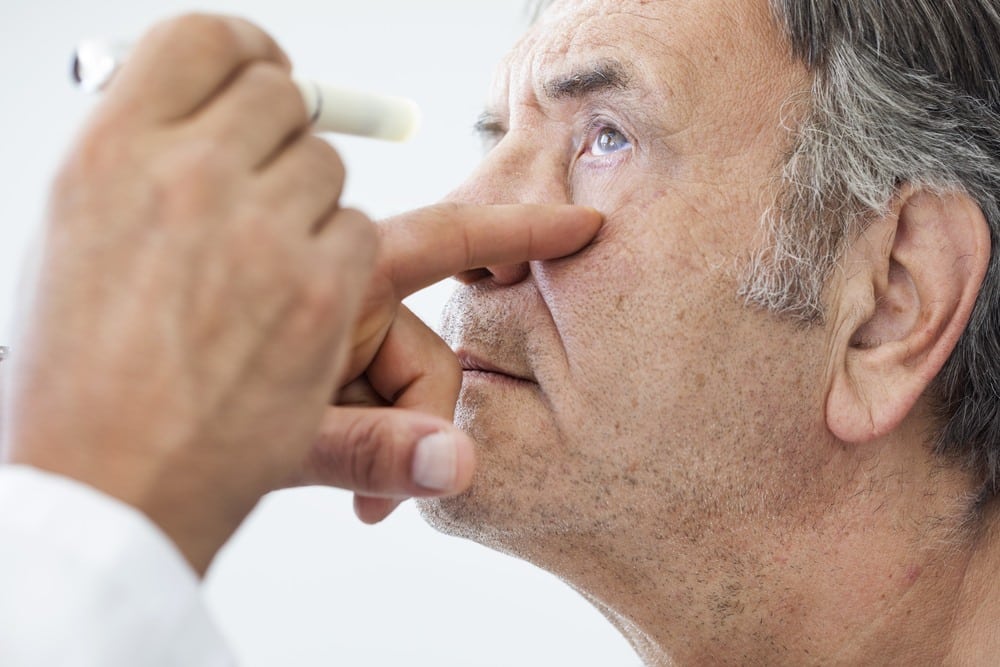Visual distortions, popularly known as visual disturbances, can interfere with your normal vision. If you’re experiencing any distorted vision, you may wonder whether it’s a life-threatening condition or not. While visual distortions may result from various medical conditions, they can either be temporary or permanent.
In the article, we will explore what visual distortions are, their symptoms and causes, treatment options, and more.
What Are Visual Distortions?
Visual distortions are conditions of the eyes that impair your ability to see clearly. Objects will appear bent, disfigured, cloudy, or wavy if you have a visual distortion. Distorted vision makes familiar objects difficult to identify. For most people, objects may appear smaller or larger than they should, while straight lines tend to look bent or crooked.
People with vision distortions often find the condition challenging to live with, especially when trying to perform their daily routines. If the condition is temporary, you can relieve it with minor treatments, such as vision therapy.
However, if your distorted vision is permanent, it may result in lifelong functional blindness. Visit your healthcare provider so that they can assess and treat any form of visual distortions you may be currently experiencing.
Types of Visual Distortions
There are various types of vision distortions that may affect part or the entire visual field. Visual distortion may also occur in one or both eyes and can affect the cornea, iris, lens, pupil, optic nerve, macula, retina, and vitreous gel.
These are the following forms visual distortions can take:
- Blindness: Can either be partial or total. In partial blindness, you can see the light and objects near you, though to some degree. For total blindness, you can’t see the light or any objects.
- Double vision (diplopia): You can see objects appearing in duplicates despite being single entities. The second object may appear vertically or horizontally attached to the first.
- Blind spot (scotoma): This is a partial loss of vision in the visual field. The blind or dark spot may appear like a blurry, dark, or fuzzy spot. It may also be a spot of flickering light.
- Floaters: Floaters look like small dark shapes floating in your visual field. These tiny shapes may appear as dots, strings, specks, squiggles, or cobwebs. You may notice floaters when staring at a light-colored surface.
- Halos: Halos are circles of light that appear to surround an object.
- Blurry or cloudy vision: You may feel like someone has covered your eyes with a filter, making you see hazy objects.
- Color blindness: With color deficiency, it is more difficult to differentiate between one color and another, or shades of a similar color.
- Poor nighttime vision: Also called nyctalopia or night blindness. If you’re suffering from this, you might experience difficulties seeing at night or in dimly lit rooms.
- Flashes of light: Flashes of light appear as bright spots in your visual field. The most common flashes occur from disruption to the vitreous gel.
- Eye pain: Can vary depending on your underlying condition. With eye pain, you may experience a scratching sensation when opening or shutting your eyelid.
Causes of Visual Distortions

Distorted vision can result from different medical conditions. Whether intermittent or temporary, it’s advisable to visit your healthcare provider before the situation deteriorates. Some visual distortions may be signs of extreme medical emergencies that need treatment, or they could potentially lead to blindness.
Understanding the underlying condition is essential because some vision distortions may result from severe conditions outside your visual system. However, with prompt intervention, you can reduce the risks of serious complications.
Below are the possible causes of vision distortion.
- Astigmatism: This results from a mn imperfect cornea or lens and causes light to focus on two points in your vision instead of one. The condition makes you have blurry or distorted vision.
- Aneurysm: Can result from the enlargement of an artery in your brain. This condition can also cause double vision or an abnormal pupil size.
- Cataracts: Might result from normal aging and are common among people aged 55 and above. Diabetes and smoking may also increase the chances of cataracts, which could cause your eye lens to become blurred or cloudy. It can also cause vision loss, halos, and night blindness.
- Dry eyes: This syndrome can be mild or extremely severe. With dry eye disease, you might experience a persistent or recurrent sensation of dryness in your eyes. This tends to make them feel scratchy, dry, or gritty. Additionally, dry eye disease often leads to blurry vision.
- Diabetes: Can cause visual distortion resulting from high blood sugar levels. The condition may lead to nerve damage, as well as double vision, blurry vision, and vision loss.
- Hyperopia (farsightedness): Farsightedness is a medical condition that makes distant objects easier to see than those closer. When suffering from farsightedness, objects near you become hazy or blurry.
- Myopia (nearsightedness): Unlike farsightedness, nearsightedness makes closer objects easier to see than those far away. Objects far from you appear hazy or blurry and are difficult to identify.
- Head injury: Injuries to your head can cause various visual distortions like double vision, blurry vision, trouble focusing your eyes, and loss of peripheral (side) vision.
- Brain tumor: Abnormal cells in your brain can cause blurry vision, double vision, and vision loss.
- Hypertension: Hypertension may cause blurry vision and loss of vision.
- Glaucoma: Can lead to increased eye pressure, damaging the optic nerve. Glaucoma can also cause visual distortions such as halos, blurry vision, and peripheral vision loss.
- Presbyopia: This is a condition in which people lose their ability to see near objects as they age. It also causes close objects to appear blurry or distorted.
- Visual migraine: May occur with or without a headache, For many, it causes a throbbing headache that can last minutes or hours. The condition may lead to temporary vision distortion, causing the flashing of lights and blind spots.
- Stroke: This results from blood failing to reach a part of the brain. The condition causes blind spots, blurry vision, double vision, and vision loss.
- Eye cancer: The growth of abnormal cells in the retina or around the eye. The condition can lead to visual distortions such as a dark spot on your iris, blurry vision, and a change in the normal position of your eyeball.
There are multiple medical conditions associated with distorted vision, and we’ve only named a few. If you are experiencing any of these symptoms of visual distortions, be sure to see your doctor for diagnosis and treatment right away.
Common Symptoms of Visual Distortion
Symptoms of vision distortion may vary depending on the disease, disorder, or condition causing visual distortion. The most common symptoms associated with visual distortion include:
- Eye irritation or pain
- Itchy eyes
- Discharge from the eye
- Dry eyes
- Eyelid swelling
- Bleeding from the eye
- Droopy eyelids
- Eye redness
- Watery eyes
- Increased sensitivity to light
- Abnormal pupil size
- Change in eyeball position
Besides having visual distortion symptoms in your eyes, you may experience symptoms from other body parts. Some of the other symptoms of vision distortions include:
- Difficulty speaking
- Difficulty understanding speech
- Fatigue
- Fever
- Seizure
- Facial drooping
- Paralysis
- Abdominal pain
- Depression
- Headache
- Stiff neck
- Sudden numbness
- High blood pressure
- Trouble concentrating
- Confusion
- Joint pain
- Tremor
- Difficulty walking
- Sudden memory loss
Visual Distortion Treatment Options

If you are experiencing one or more symptoms of vision distortion, your doctor should be able to determine the underlying condition that might be causing your visual distortions. Once they have discovered the problem, your doctor might use one or multiple of the following treatment options:
- Medication: Your doctor may use medicine to treat underlying conditions, thus eliminating visual distortion symptoms.
- Dietary changes: This can be helpful to people with diabetes and other health problems. Your doctor may advise you to avoid certain foods and recommend those you should take to improve your vision.
- Surgery: Might be necessary for damaged nerves or eye muscles, and it could potentially relieve or repair the damaged parts.
- New glasses or contact lenses: If your doctor can’t correct visual distortion with medication, surgery, or dietary changes, they might recommend new glasses or contact lenses.
- Eye patch: This treatment involves covering one eye to stop diplopia (double vision). An eye patch is not permanent, but it can be helpful before your doctor finds a permanent solution.
Final Thoughts
Vision distortion can be intermittent, temporary, or permanent. If you experience any of the above symptoms, it is important to reach out to your healthcare provider immediately for diagnosis and early treatment. Contact Art of Optiks today to ask for advice and prompt treatment to avoid permanent vision distortion.

